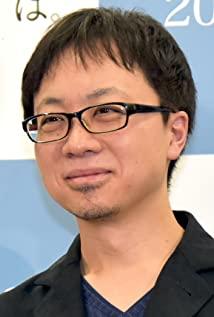Alone, after watching "Your Name", although I felt a little uncomfortable surrounded by two couples left and right, I was once again immersed in another world.
Different from watching "The Garden of Words", although "Your Name" is very good, it does not arouse my yearning. Because the complex that he uses to win people's hearts is a question that I already want to understand.
The psychological technique used in "Your Name" is to give a very idealized way of "representation" of mental states such as "waiting" and "pursuing":
Do you always feel like you're waiting for something?
Do you always feel like you are looking for something?
Taking this inexplicable and very common vague psychological state as an opportunity to integrate it into the creation of the story is Makoto Shinkai's forte.
But the question is, let's imagine what would happen if the "body" swapped was not a handsome boy and girl in puberty? A line that came to my mind at the time was what Qingxia said to the Supreme Treasure through Zhu Bajie's mouth in "Journey to the West", "If God made you fall in love with Zhu Bajie, would you love it too?"
It's a way of looking at love that I hate, without asking why, and having no choice. In my opinion, completely baffling.
You and him exchanged "bodies" and fell in love with each other?
Why? Why do many people accept this setting?
Because all love is inherently narcissistic.
The fundamental motivation of love is a kind of identification with "self". In other words, in his being in sex, he really refers to his own nature. Taki and Mitsuha, in an extremely special situation, experienced a unique alienated self-nature, and thus found a seemingly more solid way for the establishment of self-nature-even if they are separated from my body, I am still me.
In fact, this is the proof that self-nature does not exist.
Now I'm going to open my mind:
What Taki and Mitsuha exchanged were not bodies, but "memory".
In other words, you can think of your body as a portable hard drive, and Jingu Family's inherent ability is to exchange data on this hard drive with others. In other words, it's not "Taki" who is always greedily touching Mitsuha's chest, it's just Mitsuha herself who has Taki's memory. And it wasn't "Sanye" who helped the seniors mend their skirts, but only three pages of "records" that once had. It's like a comet splitting up and merging with the Earth. Earth, which shares part of a comet, is still Earth, and it does not become a comet.
Therefore, in the above, I exchange "body". The body is in quotation marks. Since there is no "self-identity" apart from the body, there is of course no "exchangeable" who can exchange bodies. The behavior of exchange is naturally impossible. But swapping memory I think is possible. Therefore, Taki didn't really go there with his grandmother and the others, he just had the memory of Mitsuha who "had Taki's memory" going there. The exchanges between Taki and Mitsuha are similar to the flashbacks of the robots in "Westworld". In fact, it's just a self-talk.
I also often walk on the street and see a certain beautiful woman, I feel very familiar, as if something happened to her in my previous life. Actually, that's what it is. It was fate that I met her. If the past life is regarded as a kind of "plot" that can be recalled, shared, and mutually verified, then my past life must have intersected with her. But, don't forget, all the good must be accompanied by more ugliness. My encounter with all the people I like can be traced back to a whole set of specific plots. This also means that the process of my encounter with all the things I hate must also be fully described. Comparing the two, I think it's okay. After all, there are more things I hate than things I like.
Similarly, if it is possible to exchange memories, then the person who exchanges memories with me may be the aunt of the vegetable market, the old king next door, or a taxi driver, who can be exchanged for a young, beautiful, pretty girl who can touch the European style. How small is the possibility? After thinking about it, I still don't want this experience.
Many people may not understand why the two did not notice the difference in time after exchanging "bodies". As I said, the problem is that the body is not exchanged, it is only "recorded" when it is exchanged. And this record, after being exchanged again, will be quickly overwritten. That is to say, that Taki who turned into a mother, the handsome Mitsuha, is not someone else, but the person who remembers the memory of others. Time is natural to that person, of course, and even if you notice it, it won't stay in your memory. It will not be copied to another person, or, even if it is copied, there is no way to be aware of it. This is reflected in Taki's recall of Mitsuha's memory after he fell in front of the divine body.
In fact, time is such a thing. It only exists when it is noticed.
So is it possible, in fact, that we are just a record living in the memories of others?
Is that other person just a fantasy of mine?
Perhaps the world is constructed in this recording and recording, interweaving and interweaving, mutual mapping and intertwining.
Time is not a physical fact, but a psychological fact. In other words, all the facts are just a more "real" record, an incomplete copy.
We live in the dreams of others, we are in the dreams of others, and the dreamer is ourselves.
Why did Taki fall in love with Mitsuha?
I think it can also be understood. If we divide a person into three parts, I will roughly divide it into "body, memory and personal connections", so when we like a person, what exactly do we like? If the memory cannot be shared, in fact, what we like can only be the other person's body and the place where she is. Taki and Mitsuha, through the sharing of memories, are actually not given to a certain person or anyone, but they like an alternative way of living, a "there".
Therefore, if we do not regard people as just a collection of memories, but represent a "place" rooted in the earth with its own sky, connections, and gods, then the so-called liking cannot be a kind of The desire to possess can only be a yearning for somewhere else, an encounter through a certain place.
Encountering good works is actually like talking about a sweet love. It brings not only a memory, a record, but more beautiful possibilities.
I was thinking, what happened 1200 years ago?
Is there some mysterious element that has melted into the body of the Jingu family, so that they have the ability to "psychic"?
And the so-called psychic, is it really just exchanging memories with someone in the past or future?
Is Mitsuha's father the one her mother exchanged?
What if the time difference between two people who exchanged memories was not three years, but a thousand years? What will be the result?
All in all, this is a good movie. Thank you Makoto Shinkai, thank you for "Your Name", and thank you for the "you" who recorded his memory of watching this film.
View more about Your Name. reviews











